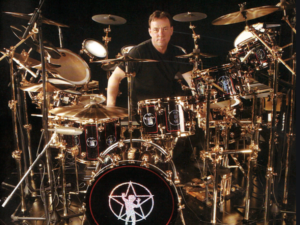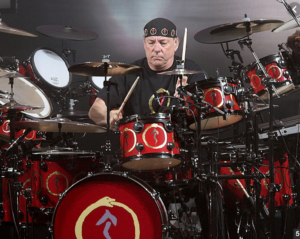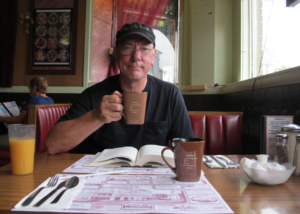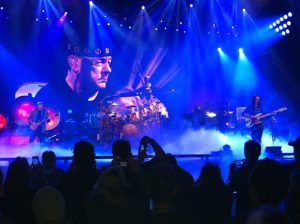When I completed my blog installment last week, I had some leftover memorabilia items I figured I’d save for this week. Mostly baseball stuff I had found online, including an incredible letter to my father from Mr. Ford Frick, then President of the National League, about the 1948 All Star Game that, as far as I know, nobody in our family knew anything about. It was just going to be another one of those blogs. And then everything changed on Friday.
“Suddenly, you were gone. From all the lives you left your mark upon…” -Neil Peart from the Rush song “Afterimage”

I don’t recall exactly what time it was last Friday when I saw the first post on social media. I saw Neil Peart’s photo and, no doubt needless to say, that got my attention. And then my disbelieving eyes saw the headline. At the young age of 67, the drummer and lyricist for Rush had passed away from a very aggressive form of brain cancer. I was in shock, initially. A tiny part of me clung to the belief that the internet is a savage beast and maybe, just maybe, this was a hoax. It was not.
I was crushed more than I thought I’d ever be. It was as if I’d lost a family member, and no I’m not exaggerating or using hyperbole. I was searching for a way out of this tragedy. I was shattered by what this not only meant to me but what it meant to millions of others who had come to not just respect and enjoy the art this man made, but to revere it.
I’ll admit I’ve been an outspoken Rush fan for the last 40 years. I know all sorts of people who are enormously devoted to musical artists and bands, and I further know that taste in music is not at all different from taste in food, or movies, or anything else. What is one person’s delicacy is another’s trash. That’s just the way it is. I was never shy about expressing my fandom and my appreciation for what these three “normal guys” could do musically and what it meant to me. Geddy Lee, Alex Lifeson, and Neil Peart could not be much more normal. All devoted husbands and fathers. All serious musicians who approached their art with sincerity and purpose. All perfectionists who also shared a warped sense of humor. All believers in the theory there is always more out there, always more to accomplish. There’s always more.
I knew Rush from early on, thanks to KSHE-95 in St. Louis, an album-oriented rock station that played many of their early songs. Songs like “Working Man” and “Fly By Night” seemed great to me, but so did music by a ton of other progressive and talented bands. It was not until I dropped the needle on my first copy of their seminal album “2112” (maybe a year after it came out, actually) that I felt my brain explode from what I was hearing. There was nothing like it.
Neil Peart was a magician, with both words and sticks. He was a voracious reader, and did indeed like his philosophy and science fiction books. His early lyrics reflected that completely, and often were outlandish tales of fantasy. As Geddy Lee once said, when talking about the fact his own mother just “didn’t get” what they were doing as a band and what their songs were about: “By-Tor and the Snowdog? What is that about?” Exactly. But it drew many of us in. No one else was playing music this complex with lyrics this literate.
As their career continued, I became more and more of a devoted fan. They developed. They grew. They never paid attention or cared about what the rest of the music scene was doing. They wrote and played what they wanted, in the way they wanted, and if anyone out there cared to listen and like it, that was just fine. It was nothing near the mainstream. As Geddy said, “We had our own stream, and it was way outside the main one.”
As he grew, Neil’s lyrics shifted to be more personal, while his playing kept developing into something otherworldly. He began to write about life, and relationships, and the normal stresses of youth. He’d considered himself an outsider from childhood and his lyrics often illustrated that. As a Canadian boy who couldn’t skate well enough to play hockey, he was the kid who never sat at the cool kids’ lunch table. Instead, he dove into books and drumming.
“Growing up it all seemed so one-sided. Opinions all provided. The future pre-decided. Detached and subdivided in the mass-production zone. Nowhere is the dreamer or the misfit so alone.” -Neil Peart from the Rush song “Subdivisions”
As his drum skills evolved, his “tool kit” evolved right along with that. Over time he added to his kit, whether it be more drums, more cymbals, more bells, or more effects. Before long, he was surrounded by a circle of percussion instruments on stage, all placed on a circular platform that would spin around so that he’d still be facing the audience when he played the backside of the kit.

And none of that literacy or skill came without criticism. As a whole, the band was (at best) ignored by the critics or (at worst) horribly ripped to shreds. They were far too outside that “mainstream” to be appreciated, and Neil’s playing seem far too over-the-top to be recognized. As a kid, he’d idolized Keith Moon from The Who and John Bonham from Led Zeppelin, because of their ferocious approach to “hitting things with sticks” but something about their reckless playing didn’t satisfy him. His goal was to play all the beats, all the notes, all the difficult stuff, but then perfectly replicate it time and time again. Always perfect. Always beyond what most other drummers could dream of.
Well into his career, he felt his playing was at a plateau, so he did what few other drummers would dare do. He went to work with famed drum mentor and jazz expert Freddie Gruber to reinvent his style. He tore down all his habits and rebuilt the way he attacked the drums. It was a profound example of his desire to never settle for where he was or what he was.
He had a love for those who came before him, especially Buddy Rich. He could seamlessly switch from his bombastic Rush style into a Big Band style in a single beat, and often did that during his legendary drum solos.
He changed drumming. The list of today’s best and most respected drummers who proclaim proudly that Neil Peart was the reason they began to play, and then strove to be better at the art every time they sat behind a kit, is too long to list.
And then tragedy struck his life. Not long after the tour that followed up the album “Test For Echo” his teenage daughter was killed in a car accident. Devastated, Neil and his wife moved to England to be far away from the memories of those roads and towns in Canada. And then his wife got sick. Within mere months she passed away from cancer, although Neil always stated he believed she died from a broken heart. The man could not have been more shattered, and he questioned his own will to carry on. Rush, as a band, no longer existed.

He finally embarked on a nearly endless motorcycle trip, across Canada and then down to Central America, before heading back home. He was simultaneously running away from something but also hoping to run toward something else. He had never been comfortable with fame, and craved the anonymity of the open road, where he could simply work on his own well-being without be recognized. “Just a guy in a coffee shop, reading a book” as he put it.
Geddy and Alex were nearly certain the band would never play again, but Neil found his salvation in that lengthy trip. He wrote about it in his first best-selling book “Ghost Rider” and finally decided to reach out to his band brothers to see if they might play again.
It had been about five years. He hadn’t picked up a stick since his dual tragedies. He had no idea if he could even still play. The album they created then, in 2002, was “Vapor Trails.” It was a masterpiece. I listen to it to this day, and I’m always struck by the urgency of the playing. All three of them are playing at a manic pace, trying to express just how much it meant to them to even get back to that place. You can’t miss it. And the lyrics were a million miles from the science fiction stuff of Neil’s early years. It all had to be personal, whether it was about his own life or what the planet was going through, not long after 9/11.
“Pack up all those phantoms. Shoulder that invisible load. Keep on riding north and west, haunting that wilderness road. Like a ghost rider. Carry all those phantoms, through bitter wind and stormy skies. From the desert to the mountain, from the lowest low to the highest high. Like a ghost rider.” -Neil Peart from the Rush song “Ghost Rider”
“All this time we’re burning like bonfires in the dark, a billion other blazes are shooting off their sparks. Every spark a drifting ember of desire, to fall upon the Earth and spark another fire… Dream of a Peaceable Kingdom. Dream of a time without war. The ones we wish would hear us, have heard it all before.” -Neil Peart from the Rush song “Peaceable Kingdom”
The band was back, and better than ever. After all those years of snide remarks and disrespect, the critics finally “discovered” them. They sold out shows in major arenas, and topped the charts with their new albums. And unlike so many other bands that just play out the string to keep making money, they were creating what most consider some of their best work.
When they released “Clockwork Angels” in mid-2012, everything went into overdrive. It was a full-on concept album, based in the “steam punk” view of the lyricist, and it blew the public and media away. The reviews were stellar. The concerts were SRO. They even brought other musicians onto the stage with them for the first time, and those musicians were dubbed the “Clockwork Angels String Ensemble.” Yes, they enlisted a group of respected string players to back them, and the shows were beyond belief.

I saw Rush somewhere around 24 or 25 times. That’s just a guess, because in my early years I never thought to actually count the number of shows I saw. It could be more like 26 or 27. The “Clockwork Angels” show was the final one. Barbara and I actually flew down to Anaheim to see it at the Honda Center arena, and we were in the fifth row. I took this photo on my phone, and loved the fact Neil was on the big screen behind them at the time, while they wowed the crowd with their newest creation. And really, what band creates one of its best masterpieces after 40 years of playing?
In 2015, they embarked on what they titled the “Rush R40” tour, to celebrate their four decades together. It was a brilliant retrospective show, which featured their music from the current day back to their humble beginnings, in that reverse order. As yet another sign of their humor, they had roadies constantly on stage, replacing the newer set-ups with familiar older ones, until finally they were playing with small amplifiers sitting atop chairs one would find in the gymnasiums they had often played. They always took the art seriously, but never took themselves too seriously.
Unfortunately, for me, work schedules and tour schedules didn’t mesh. I couldn’t get to a show. My “Clockwork Angels” memories will have to be all I have in terms of a personal involvement. It wasn’t a bad way to go out.
The band had let it be known that the tour would most likely be their last. No reason (other than age and families) was given. They documented the tour with a phenomenal DVD called “Time Stand Still” and I still can’t get through it without Kleenex. It’s a wonderful tribute to not just the band, but their devoted fans. Heck, the fans are the stars of the show. Watch it someday. It’s a window into the world of Rush fans. They’re normal people, just like the the three guys in the band. Just like me (I think) as well.
Looking back now, it’s hard to think Neil didn’t know something was wrong. He was diagnosed only a few months after the tour ended. He battled for three and a half years, but in his own style he kept it very private and quiet. Much like he never felt comfortable with fame, he would certainly never be comfortable with millions of his fans knowing he was so sick. His family, his bandmates, and his close circle of friends did an amazing job of keeping the secret. I had no idea until I saw the headline last Friday.
Neil Peart is gone. I’m coming to grips with it nearly a week after the news broke. I don’t think I could’ve written this blog last week after I learned of it. The enormity of it was too much.
As one final pitch (I said that I openly admit I’m outspoken about this band), I’ll just bring it up that in 2010 they were featured in a documentary that won many awards, including the prestigious Tribeca Film Festival award for documentaries. It’s “Beyond The Lighted Stage” and it’s masterful, but it’s also extremely personal and it’s a wonderful look into the childhoods and upbringings of Geddy Lee, Alex Lifeson, and Neil Peart. Let me put it this way: I begged Barbara to watch it with me. She appreciates Rush but they’re not exactly her cup of tea. She loved it, and was happy to tearfully tell me that after we watched it. It’s worth buying, renting, or stealing. The day the news shattered me, I watched it yet again. I needed to.
And now it’s all we have. The photos taken at concerts. The DVDs. The music.
And we have the memories. I respect the three of them so much. I enjoyed their music and mastery of their craft. I was ceaselessly impressed with their dedication to be the best they could be.
I’ve been so pleased by the outpouring of comments and tributes about Neil from around the globe. This band that was marginalized for so many years before finally getting their due (and their induction into the Rock Hall of Fame) and this drummer who was dismissed by some for actually being too good, with too many drums in his kit, were being recognized for how special they were. And how special Neil was. I knew it all along.
And the outpouring of notes I personally received was stunning. “You were the first person I thought of when I heard the news” was the most common sentiment. I guess being so outspoken had an impact, although it might not have been pleasant for the listener or reader at the time. I appreciated every word.
That’s it. That’s all I can write.
And you likely know the drill: If you are a Rush fan, or a Neil Peart fan, or just the opposite but you enjoyed the tribute above, please click on the “Like” button at the top. That would be a very fine tribute.
Bob Wilber, at your service and still coming to grips with it. But now I’m celebrating instead of mourning.
PS: I was just in my car on the way to and from the grocery store, because we’re supposed to have a major snowstorm tomorrow and Saturday, and well… You have to go to the store! On SiriusXM radio they have turned their “Deep Tracks” channel into a Rush and Neil Peart channel. I was listening both ways and the host (a guy I’ve never heard of) kept calling him Neil Pert. It’s pronounced Peert. Like you’d peer in a window or stand on a pier. One would think the host of a channel honoring the man would know how to pronounce it. Ugh.